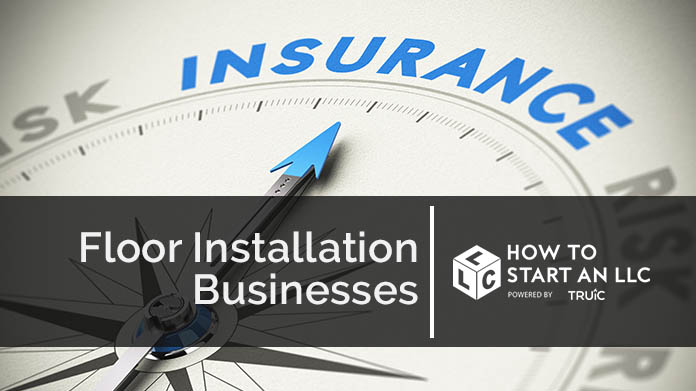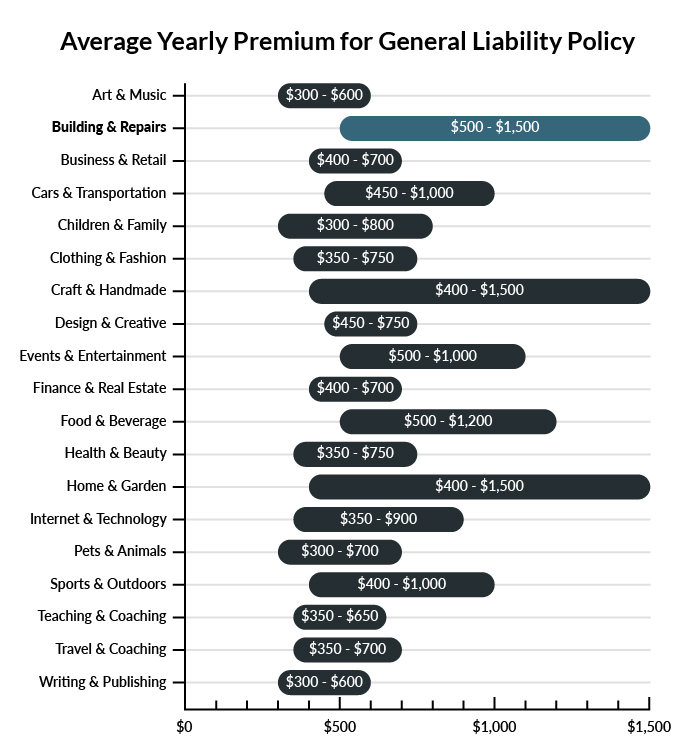Floor Installation Business Insurance
Getting insurance for your floor installation business is essential.
Floor installation businesses need to be protected against things like claims of negligence, product liability, and property damage.
For example, an employee improperly installs flooring that leads to a customer’s injury, or they damage the customer’s house during the installation process.
We’ll help you find the most personalized and affordable coverage for your unique business.

Recommended: Ergo Next Insurance is dedicated to matching small businesses with the right policy at the best price.
Best Insurance for a Floor Installation Business
General liability insurance is — generally speaking — one of the most important insurance policies for floor installation businesses.
Some of the risks general liability insurance covers are:
- Bodily injury
- Property damage
- Medical payments
- Legal defense and judgment
- Personal and advertising injury
While general liability is a very comprehensive policy, if you are looking for complete protection for your floor installation business, it’s worthwhile looking into some of the following:
- Commercial auto insurance for your company’s vehicles
- Commercial property insurance for any equipment or office space you possess
- Workers’ compensation insurance in the event you hire other people
- Commercial umbrella insurance to cover costs that go beyond your other policy limits
The first step in finding the insurance provider that is best suited to your business is to find out which category of insurers is best suited to you:
- Traditional brick-and-mortar insurers — includes well-known, established names like State Farm and Nationwide
- Online insurers — Includes newer names like Tivly and Ergo Next Insurance
It is typically advised that small businesses opt to acquire their business coverage from online insurers since they are far more accessible and affordable, thanks to their low operational costs.
Let’s Find the Coverage You Need
The best insurers design exactly the coverage you need at the most affordable price.
Cost of General Liability Insurance
The average floor installation business in America spends between $500-$1,500 per year for $1 million in general liability coverage.
Compare the average cost of general liability insurance for a floor installation business to other professional industries using the graph below.
Several factors will determine the price of your policy. These include your:
- Location
- Deductible
- Number of employees
- Per-occurrence limit
- General aggregate limit
You may be able to acquire general liability insurance at a discounted rate by purchasing it as part of a business owner’s policy (BOP) rather than as a standalone policy.
A BOP is a more comprehensive solution that includes multiple forms of coverage, such as business interruption and property insurance.

Find the Best Rate
Discover the best coverage at the lowest rate in our affordable business insurance review.
Common Situations That General Liability Insurance May Cover for a Floor Installation Business
Example 1: You have removed the old floor but have not installed the new flooring yet. The client tries to enter the property and falls due to uneven footing. They file a legal claim against your business. Your general liability policy will cover your legal defense costs, including the cost of a settlement if the case is decided out of court.ry.
Example 2: One of your employees loses control of a dolly while moving tiles from a truck to the property. The heavy boxes of tiles fall on the client’s elaborate landscaping, smashing lighting installations and exotic plants. The general liability policy you carry will likely cover the replacement and repair costs for the damage done to the client’s property.
Example 3: A competitor claims that you are using a logo that is too similar to theirs and takes legal action against your business. Your general liability policy will cover the costs of your legal defense and the costs of paying damages to the competitor if you are found liable, up to your policy limits.r.
Other Types of Coverage Floor Installation Businesses Need
While general liability is the most important type of insurance to have, there are several other forms of coverage you should be aware of. Below are some of the most common types of coverage:
Commercial Auto Insurance
Getting your employees, installation equipment, and flooring materials to the job site requires company vehicles. Every vehicle that is used for business purposes should have commercial auto insurance. The commercial auto policy you carry will help you meet legal requirements while also providing financial assistance in the event of an accident.
Commercial Property Insurance
Damage to your commercial property, such as tools, equipment, and flooring supplies, can be extremely expensive. Whether it is a fire or another situation that leads to extensive property loss, your commercial property insurance coverage will mitigate the financial burden to your business by helping cover the costs of replacement.
Workers’ Compensation Insurance
Installing flooring is hard work. Injuries can happen at any time, whether from heavy lifting, power tool use, improper use of chemicals, or other accidents. A workers’ compensation policy helps you to cover the costs of workplace-related injuries and lost wages when an employee is unable to work due to injuries or illnesses suffered at work. Carrying workers’ compensation insurance is typically required by law, although specific laws vary by state.
Commercial Umbrella Liability Insurance
A general liability insurance policy has specific limits that may not be high enough to cover the costs required to protect your business. Commercial umbrella liability insurance is designed to supplement general liability insurance. If you find yourself in a situation where the damage is significant enough to exceed your general liability policy, commercial umbrella liability insurance will help to pick up the slack.
Additional Steps To Protect Your Business
Although it’s easy (and essential) to invest in business insurance, it shouldn’t be your only defense.
Here are several things you can do to better protect your floor installation business:
- Use legally robust contracts and other business documents. (We offer free templates for some of the most common legal forms.)
- Set up an LLC or corporation to protect your personal assets. (Visit our step-by-step guides to learn how to form an LLC or corporation in your state.)
- Stay up to date with business licensing.
- Maintain your corporate veil.
Floor Installation Business Insurance FAQ
Yes, absolutely. You will need to first get a quote from an online business insurance provider like Ergo Next Insurance. Ergo Next allows you to then purchase a policy immediately and your coverage will be active within 48 hours.
A typical business owner’s policy includes general liability, business interruption, and commercial property insurance. However, BOPs are often customizable, so your agent may recommend adding professional liability, commercial auto, or other types of coverage to your package depending on your company’s needs.
“Business insurance” is a generic term used to describe many different types of coverage a business may need. General liability insurance, on the other hand, is a specific type of coverage that business owners need to protect their assets.
To ensure that the financial resources of your floor installation business are sufficiently protected from the multitude of risks inherent to this industry, business insurance is an operational requirement.
Moreover, it’s common for certain types of business insurance (e.g., commercial auto insurance and workers’ compensation insurance) to be a legal requirement.
Not necessarily. Certain exceptions may be written directly into your floor installation business insurance policy, and some perils may be entirely uninsurable.
Yes, an LLC is meant to create a legal barrier between your business and your personal assets and credit. If you haven’t formed an LLC yet, use our Form an LLC guide to get started.
An LLC doesn’t protect your business assets from lawsuits and liability– that’s where business insurance comes in. Business insurance helps protect your business from liability and risk.